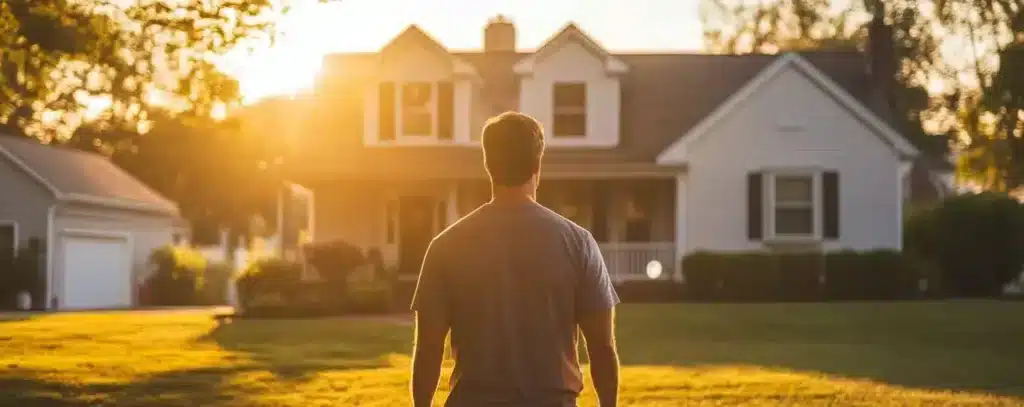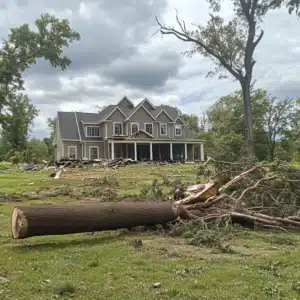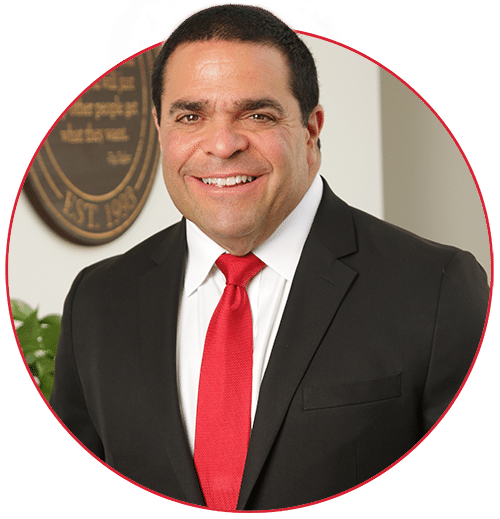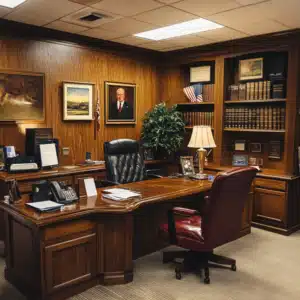Who Is Responsible If Someone Gets Hurt On Your Property? Find Out Now
Last updated Friday, October 18th, 2024

When someone gets hurt on your property or someone else’s property, determining who is responsible involves understanding premises liability laws. This article breaks down your responsibilities as a property owner and explains how different visitor types influence liability. Learn what actions you need to take to ensure safety and minimize risk.
Key Takeaways
- Premises liability law holds property owners accountable for injuries due to unsafe conditions, emphasizing the duty of care owed to different types of visitors, such as invitees, licensees, and trespassers.
- Property owners must take proactive steps, including regular inspections and prompt repairs, to safeguard their premises and minimize potential legal liabilities.
- Property owners are also responsible for maintaining safe environments on someone else’s property, and they can face legal implications if negligence leads to injuries.
- Consultation with an experienced premises liability lawyer is crucial for navigating claims and understanding legal rights and obligations, particularly when facing liability issues.
Understanding Premises Liability Law
Premises liability law is a legal principle. It holds property owners accountable for injuries resulting from unsafe conditions on their property. Whether you own a home, a rental property, or a commercial space, knowing your responsibilities under this law is crucial. Premises liability mandates that property owners take reasonable steps to ensure a safe environment for visitors. This involves regularly inspecting your property and addressing any potential hazards.
Premises liability is influenced by several factors. These include the relationship between the property owner and the injured person, the property’s condition, and the actions taken to mitigate hazards. For instance, the duty of care you owe to a visitor depends on their status, whether they are an invitee, licensee, or trespasser. This differentiation determines the level of responsibility and the potential liability you might face if an injury occurs. Additionally, property owners must also consider the safety of someone else’s property, as they can be held liable for injuries resulting from unsafe conditions on properties they own but do not personally occupy.
Types of Visitors and Their Impact on Liability
The type of visitor on your property significantly impacts your liability under premises liability law. Visitors are categorized into three main types: invitees, licensees, and trespassers, each with varying degrees of care owed by the property owner. Scenarios where individuals can be injured on someone else’s property highlight the responsibilities of property owners to maintain safe environments and the legal implications in cases of negligence.
Grasping these categories helps you better protect visitors and manage potential hazards effectively.
Invitees
Invitees are individuals who enter your property for a mutual benefit, such as customers in a store or contractors performing work. As a property owner, you owe invitees the highest duty of care. You must ensure that your property is safe and free from hazards that could cause injury. This heightened responsibility involves regularly inspecting your property and promptly addressing any potential dangers.
The legal obligation to invitees is more stringent compared to other visitor types because they are on your property for your benefit as well as theirs. If an invitee is injured due to a hazard that you knew or should have known about, you can be held liable for their injuries. Maintaining a safe environment and promptly addressing hazards are vital.
Licensees
Licensees are individuals who enter your property with your permission but for their own purposes, such as social guests. The duty of care owed to licensees is moderate and requires property owners to take reasonable steps to ensure their safety. You must address known hazards on your property but are not required to inspect for unknown dangers as you would for invitees.
However, if you are aware of a dangerous condition, you must either fix it or warn the licensee about it. Failure to do so can result in the property owner being held liable for any injuries the licensee might sustain. The critical factor is the property owner’s awareness of the hazard and their reasonable steps to prevent harm.
Trespassers
Trespassers are individuals who enter your property without permission. Generally, property owners owe a very limited duty of care to trespassers. You are not required to keep your property safe for trespassers, nor are you typically liable for their injuries, provided you have not intentionally created hazards to harm them.
However, there are exceptions, especially when children are involved. For instance, if you have an attractive nuisance, such as a swimming pool, you might be required to take reasonable steps to prevent trespassing and potential injuries. The law recognizes that children might not understand the dangers, thus placing a higher responsibility on property owners in such cases.
Common Causes of Property Injuries
Property injuries can arise from various hazards, many of which are preventable. Wet or slippery floors, for example, are a significant risk and can lead to slip and fall incidents. Uneven surfaces, such as cracked sidewalks or poorly maintained floors, can result in trip and fall accidents.
These types of incidents are among the most common causes of property injuries, especially when an injury occurs.
These hazards can also be present on someone else’s property, and property owners have a responsibility to maintain safe environments to prevent such injuries.
Other common hazards include poor lighting in areas such as stairwells, which can increase the likelihood of accidents. Malfunctioning staircases or missing handrails pose significant dangers, as do defective playground equipment, which can lead to injuries in children.
Understanding these common causes allows property owners to take proactive steps to mitigate risks and maintain a safer environment for all visitors.
Determining Liability in Premises Liability Cases
Determining liability in premises liability cases involves proving that the property owner or occupier breached their duty of care due to negligence. This involves showing that the property owner’s negligence directly caused the victim’s injury. If a property owner knew about a slippery floor but failed to address it, they may be held liable if someone slips and gets injured. Injuries occurring on someone else’s property can have significant legal implications, as property owners are responsible for maintaining safe environments to prevent such incidents.
Liability is established through factors such as the condition of the property, the activities of both the owner and the visitor, and the specific laws of the state. The injured party must provide evidence of their injuries, such as medical records and testimonies, to support their claims. An experienced premises liability lawyer can conduct a thorough investigation to determine the liable party and manage the legal processes and paperwork.
Injured parties must prove that the property owner’s failure to uphold their duty of care led to their injuries. This requires demonstrating that the owner did not take reasonable steps to ensure safety, thereby causing the injury. Attorneys specializing in premises liability offer valuable insights into relevant laws and precedents, helping to build a strong case.
Landlord Responsibilities
As a landlord, you have a significant responsibility to ensure that your rental property is safe and secure for your tenants. This includes maintaining the property in good condition, addressing any hazards or defects, and providing adequate warnings about potential dangers. Under premises liability law, landlords can be held liable for injuries that occur on their property due to their negligence or failure to maintain the property.
Some specific responsibilities of landlords include:
- Conduct regular safety inspections to identify potential hazards.
- Maintaining the property in good condition, including repairing any defects or damage.
- Providing adequate lighting and security measures.
- Ensuring that all necessary safety equipment is installed and functioning properly.
- Warning tenants about potential hazards, such as slippery floors or uneven surfaces.
- Taking steps to prevent accidents, such as installing handrails or non-slip mats.
If a tenant is injured on your property due to your negligence or failure to maintain the property, you may be held liable for their damages. This can include medical expenses, lost wages, and pain and suffering. By fulfilling your responsibilities as a landlord, you can minimize the risk of premises liability claims and ensure a safer environment for your tenants.
Steps Property Owners Can Take to Minimize Liability
Property owners can take various proactive steps to minimize liability and ensure a safe environment for visitors. Regular inspections, prompt repairs, and adequate security measures are critical in preventing accidents and injuries. These steps are also applicable to someone else’s property, highlighting the responsibilities of property owners to maintain safe environments. Implementing these practices demonstrates a commitment to safety and reduces the risk of premises liability claims.
Regular Inspections
Regular property inspections are essential for identifying and addressing potential hazards. Routine inspections help detect issues like uneven surfaces, poor lighting, and faulty equipment before they cause accidents.
Regular inspections ensure that maintenance needs are promptly identified and addressed, preventing larger problems down the line.
Prompt Repairs
Promptly repairing identified hazards is crucial in minimizing the risk of accidents and injuries on your property. Quickly addressing maintenance issues prevents accidents and builds trust with visitors and tenants. It shows that you are proactive in ensuring their safety, which can deter potential legal claims.
Failing to promptly repair identified hazards can result in the property owner being held liable for any injuries that occur. Regular inspections identify these dangers, but prompt action to fix them significantly reduces liability.
Timely repairs help property owners avoid legal troubles and create a safer environment for everyone.
Adequate Security Measures
Adequate security measures are another critical step in protecting visitors and minimizing liability. Property owners have a legal and moral obligation to ensure their premises are safe for all visitors. This involves installing proper lighting, secure entry points, and surveillance cameras to deter potential harm.
Besides physical security, regular staff training and clear emergency procedures are crucial components of a comprehensive security strategy. These measures ensure that everyone on the property knows how to respond in an emergency, enhancing safety and reducing liability risks.
What to Do If Someone Gets Hurt on Your Property
If someone gets hurt on your property, taking immediate and appropriate action is crucial. First, offer assistance to the injured person, including calling for medical help if necessary.
Their well-being should be your top priority.
These steps are also applicable if someone gets hurt on someone else’s property, highlighting the responsibilities of property owners to maintain safe environments.
Next, document the accident scene and any unsafe conditions that may have caused the injury.
Take photos, write down details, and gather witness statements if possible.
Keeping a record of any communication with the injured party is also crucial to avoid misunderstandings later on.
This documentation can be vital if the injured person files a premises liability claim.
Taking these steps helps manage the immediate situation and prepares you for potential legal repercussions.
Filing a Premises Liability Claim
If you have been injured on someone else’s property due to their negligence or failure to maintain the property, you may be able to file a premises liability claim. This type of claim can help you recover damages for your injuries, including medical expenses, lost wages, and pain and suffering.
To file a premises liability claim, you will need to prove that the property owner breached their duty of care to you, and that this breach caused your injury. This can be a complex process, and it’s often helpful to work with an experienced premises liability lawyer who can guide you through the process.
Some steps to take when filing a premises liability claim include:
- Documenting the incident, including taking photos and gathering witness statements.
- Seeking medical attention for your injuries.
- Notifying the property owner of the incident and your intention to file a claim.
- Gathering evidence of the property owner’s negligence or failure to maintain the property.
- Working with an experienced premises liability lawyer to build your case and negotiate with the property owner’s insurance company.
By following these steps and seeking professional legal assistance, you can strengthen your premises liability claim and improve your chances of recovering the compensation you deserve.
The Role of Insurance in Premises Liability Claims
Insurance plays a significant role in handling premises liability claims. Insurance companies process claims against property owners and often cover the associated legal expenses. Most commercial general liability insurance policies include coverage for premises liability incidents, providing financial protection for property owners. Insurance coverage is also applicable to someone else’s property, highlighting the responsibilities of property owners to maintain safe environments. Understanding the specifics of your liability coverage ensures you are adequately protected.
Notify your insurance company immediately after an injury occurs on your property, even if you don’t plan to file a claim right away. This ensures proper documentation and helps in managing future claims. Knowing what your policy covers and any potential gaps prevents unpleasant surprises and ensures you have the necessary protection when you need it most.
Contributory Negligence in Premises Liability Cases
Contributory negligence can significantly impact premises liability cases. This legal principle refers to situations where the injured party has some fault in causing their injuries, potentially barring them from recovering damages in jurisdictions that adhere strictly to this principle. For example, if a visitor ignores warning signs about a wet floor and slips, they might be considered partially at fault.
Contributory negligence is also applicable to someone else’s property, highlighting the responsibilities of property owners to maintain safe environments. Visitors share the responsibility of maintaining their safety while on someone else’s property. The assessment of fault can affect whether a plaintiff can recover damages, especially if their negligence is deemed greater than if the property owner breached their duty.
In states enforcing contributory negligence, a plaintiff found to share fault for their injuries may be completely disqualified from recovering damages.
The Role of a Personal Injury Attorney
If you have been injured on someone else’s property due to their negligence or failure to maintain the property, a personal injury attorney can play a crucial role in helping you recover damages. A personal injury attorney can help you navigate the complex process of filing a premises liability claim and can work with you to build a strong case against the property owner.
Some ways that a personal injury attorney can help you include:
- Investigating the incident and gathering evidence of the property owner’s negligence or failure to maintain the property.
- Building a strong case against the property owner, including identifying potential witnesses and gathering expert testimony.
- Negotiating with the property owner’s insurance company to reach a fair settlement.
- Representing you in court, if necessary, to fight for your rights and recover damages.
- Helping you understand your rights and options under premises liability law, and guiding you through the process of filing a claim.
Overall, a personal injury attorney can be a valuable ally in helping you recover damages for your injuries and can provide you with the guidance and support you need to navigate the complex process of filing a premises liability claim.
When to Consult an Experienced Premises Liability Lawyer
Consulting an experienced premises liability lawyer is immensely beneficial when navigating potential claims and legal responsibilities. These lawyers specialize in personal injury law and offer valuable guidance on your rights and obligations. A personal injury lawyer helps you gather evidence, determine liability, and represent you in court if necessary. Additionally, consulting a lawyer is advisable if someone gets hurt on someone else’s property, as property owners have responsibilities to maintain safe environments and can be held liable for negligence.
Many premises liability lawyers work on a contingency basis, meaning they only get paid if you win your case. This arrangement makes legal representation more accessible.
If facing a premises liability claim, seeking a free consultation with a lawyer helps you understand your options and the best course of action.
Frequently Asked Questions
What is premises liability law?
Premises liability law holds property owners accountable for injuries sustained on their premises due to unsafe conditions. This legal framework ensures that property owners maintain safe environments for visitors.
Who are invitees, and what duty of care do property owners owe them?
Invitees are individuals who enter a property for the mutual benefit of themselves and the property owner, such as customers or contractors. Property owners owe invitees the highest duty of care, ensuring the premises are safe and free from hazards.
What should I do if someone gets hurt on my property?
If someone gets hurt on your property, promptly offer assistance to the injured individual and document the scene thoroughly. It is advisable to consult with a premises liability lawyer to ensure proper handling of the situation.
How does insurance help in premises liability claims?
Insurance is crucial in premises liability claims as it provides financial support for legal expenses and potential settlements, ensuring property owners are adequately protected against claims. Understanding the specifics of your liability coverage is vital for effective risk management.
What is contributory negligence, and how does it affect liability claims?
Contributory negligence is a legal concept where the injured party’s own negligence contributes to their injuries, which can limit or completely bar their ability to recover damages. Therefore, in jurisdictions that follow this doctrine, any fault on the part of the claimant can significantly affect the outcome of liability claims.














